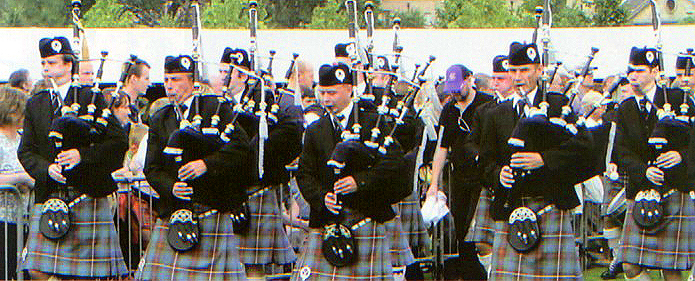
As the COVID-19 lockdown unfortunately has resulted in the complete loss of the 2020 pipe band outdoor competition season, I am sure the usual ‘reviewers’ of pipe band results must be quite frustrated that they are this year having to look for other pastimes to vent their frustrations and sometimes unfair accusations.
While the competition scene is dormant, apart from virtual versions, this may be an opportune time to take a closer (and perhaps a little light-hearted) look at some of things which can affect the efficiency of adjudicators.
Despite the impression some people try to create, the task of any form of adjudication is never an easy one and will always be open to criticism. The very nature of the role of the pipe band adjudicator opens up this possibility. In reality, the RSPBA, and other pipe band associations across the world, have gone to great lengths to try to improve judging through rigorous training courses and workshops.
I think it also fair to say that the vast majority of the adjudicators I encountered during my 34 years on the RSPBA panel tried very hard to undertake the role in a professional, honest and impartial manner. Most of the potential adjudicators I encountered when I was a member of the RSPBA Adjudicators’ Training Group also freely admitted, on completion of their training, that they found the role to be significantly different and much more difficult to what they had previously imagined.
Many important, and possibly misunderstood, factors are relevant to pipe band adjudication. Judging any form of music is a very subjective process as music affects the emotions of people in widely different ways. Consequently opinions and like vary significantly among pipe band members so why should adjudicators be any different? It is also impossible to please everyone.
Another significant factor is the unexpected dimension, the unforeseen things which can happen at any time (i.e. the influences often referred to as Murphy’s Law).
There are ways in which an objective approach can be adopted by adjudicators in the interests of consistency, particularly with regard to technical piping and drumming playing standards, but what individuals consider to be good music is much more varied.

Adjudication of pipe bands in its traditional format arguably is more complex than for other forms of music as it normally involves three musical disciplines judged separately (piping, pipe band drumming and pipe band ensemble). Each has different characteristics which can produce different results, but in practice each can have an influence on the others, which means that it is important that each discipline is not assessed in total isolation.
Piping, for example, can be affected by the tempo, interpretation, integration and dominance of the drumming; and the drumming can be affected in similar ways by the piping. Genuine thinking in a collective ‘pipe band’ context is also difficult to achieve, so inevitably it means that results between the three disciplines cannot be expected to be exactly the same.
Most players who wish to become adjudicators are normally either pipers or pipe band drummers and have not normally been taught to think in a wider pipe band musical context which ideally is necessary for pipe band adjudication. Piping, drumming and ensemble judges also tend to listen from different vantage points, meaning they cannot hear the performances in the same way.

To criticise is easy and it happens in all walks of life. Probably one of the best examples is football, where the referees are regularly subject to criticism, even when the games are officially videoed using the VAR system. And how often do we see experts on TV telling politicians how to run the country?
Could these people really do any better? Someone once amusingly described a critic to me as ‘most people must serve their time in every trade; critics all are ready-made‘! I hesitate to suggest it, but a large proportion of players in pipe bands and spectators seem to regard themselves as adjudicators without consideration, or possibly even understanding, of all the important factors which need to be taken into account.
Some players (and spectators whether or not former players) seem to consider themselves simply to be more knowledgeable and proficient than the official adjudicators and think they know better; some regard most adjudicators as biased or having business or teaching interests which make them biased; some think adjudication is only about limited parameters such as mistakes, integration and tone rather than a wider technical and musical context.

Some do not listen to the performances fully; some do not even listen to all the performances in a competition; some are reluctant to admit that there could be failings with the performance of their own band or the one they support; some base their assessments solely on a playing style they have been used to during their own playing experience; and some players do not think they can be beaten by anyone else despite knowing within themselves that their performance could at times have been better.
Self-assessment and self-criticism are never known to be easy, so the adjudicators become the focus of blame! Unfortunately the advent of social media has made the situation worse as it is easy to hide identities, and some people appear to join the debate who have never even heard the performances.
- Read the second article in this series here.
-
 Donald MacLeod Tunes – ‘Play Along’ Lessons£2.00 – £2.50
Donald MacLeod Tunes – ‘Play Along’ Lessons£2.00 – £2.50 -
 10 Tutor Books for Schools/ Bands/ Trade£105.00
10 Tutor Books for Schools/ Bands/ Trade£105.00 -
 Bagpipes – DN5 – The Finest Bagpipe Available£300.00 – £3,424.00
Bagpipes – DN5 – The Finest Bagpipe Available£300.00 – £3,424.00



















An interesting article so far Alistair and I agree with the thrust of your argument. Can’t wait to your next instalment. Certainly now is a good time to take a close look at the adjudication system, training for adjudication and the ultimate selection of appropriate people onto the adjudication panel. Roll on the next chapter on this contentious subject.